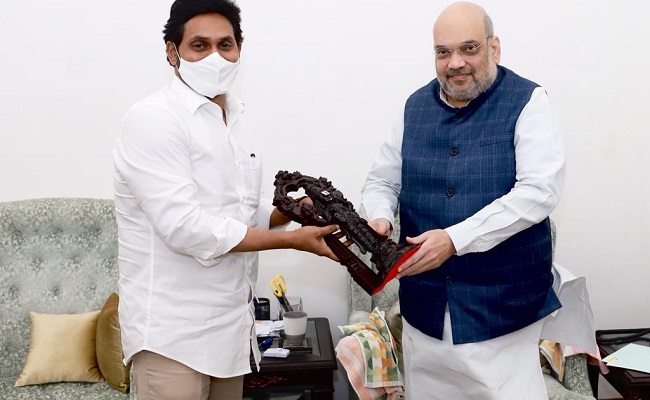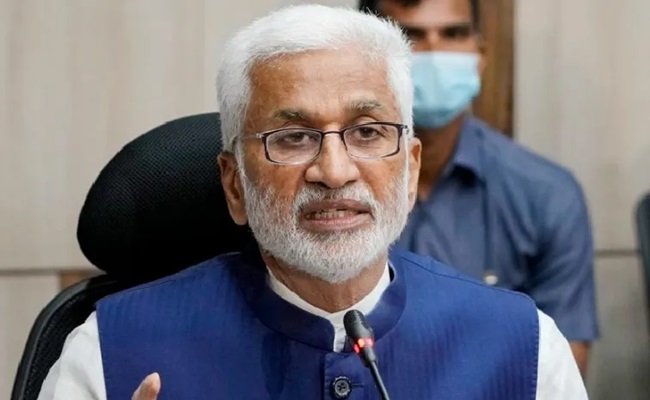
Following Andhra Pradesh Chief Minister Y.S. Jagan Mohan Reddy's meeting with Union Home Minister Amit Shah during his latest visit to the national capital, the transition to a three-capital formula for the state appears firmly on target.
However, the twists and turns so far over the issue are raising several questions in the minds of various interests groups -- citizens, investors and bureaucratic circles, among others.
It was in December 2019, barely a few months after he rode to power on the wave of a massive electoral mandate, that Reddy unveiled his plans for three capitals for Andhra Pradesh -- legislative at Amaravati, executive at Visakhpatnam and judicial at Kurnool.
The three capitals formula has apparently been propounded for equitable distribution of institutions across the residuary state of Andhra Pradesh, which had been grappling with a capital city fixation after losing Hyderabad to Telangana.
Reddy's plans have not gone down well with the opposition TDP, which had chosen Amaravati for a greenfield capital, and the around 25,000 farmers who had given up around 35,000 acres of prime agriculture lands to house the new capital. Protests and court proceedings have been playing out ever since.
With the vicious Covid pandemic spreading havoc, the issue that was simmering over the last more than 500 days sprang back to the public arena after the ruling YSRCP leaders and ministers began raising the pitch over the three-capital issue.
If examined logically, there are bound to be merits and demerits in any proposal. This holds good for the single mega capital city project at Amaravati, decided by the TDP when it was in power from 2014 to 2019. It also applies to the three-capital formula propounded by the YSRCP, which is at the helm since 2019.
Now, in a democracy, it is understood and accepted that governments come and go. As duly elected representatives of the people, they have won the right and responsibility to take decisions for the good of the people.
The manner in which the capital city issue has unfolded in Andhra Pradesh, after bifurcation, shows that India's polity is yet to come to terms with the challenges of policy, and planning.
The blame for Andhra's capital confusions must rest solely at the doorsteps of the state's political class - ruling as well as opposition. The selection of a capital city is a matter that decides the state's branding, administrative standing, and investor perception.
Frequent changes in stand or policy on issues that affect the state and its future can be disastrous to say the least. Especially in today's uncertain times in a post-pandemic scenario.
The way in which the capital city issue has been handled by the state's principal political parties is bound to raise questions in the minds of the stakeholders on the possible scenario if the opposition party returns to power after the next Assembly elections.
For a moment, visualise a scenario where another elected state government of Andhra Pradesh decides to wind up the three-capital system and return to the single capital concept again. Imagine the panic and uncertainty, not to mention the wastage of public funds and resources.
Around 25,000 mostly small and marginal farmers, who handed over their fertile lands for the Amaravati capital city, are already ruing their decision. It would be a warning signal for the people who will henceforth be wary of giving their lands for any government project.
The unfolding scenario is also a red flag for international business groups looking to invest in India. Frequent policy reversals fuelled by political agenda can only help keep the business investors at bay.
The scary part of the capital city issue in Andhra Pradesh is that it could lay the precedent for similar large-scale policy reversals in other states of the country, or even at the national level.
It, therefore, calls for statesmanship of the highest order for the ruling and opposition parties in Andhra Pradesh to sit across the table and resolve the issue, so that apart from justice for 25,000 farmers, the future development of the state is not made a scapegoat at the altar of political one-upmanship.
At the moment, the billion dollar question on people's mind is, does Andhra Pradesh's political class have the maturity to resolve the capital conundrum?
(The writer can be contacted at [email protected])













